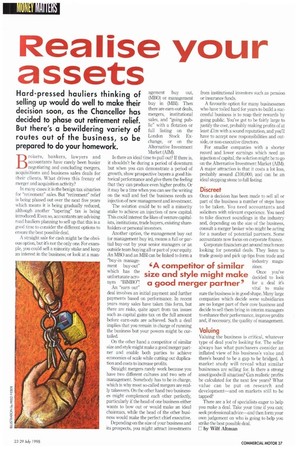Realise your assets
Page 39

If you've noticed an error in this article please click here to report it so we can fix it.
Hard-pressed hauliers thinking of selling up would do well to make their decision soon, as the Chancellor has decided to phase out retirement relief. But there's a bewildering variety of routes out of the business, so be prepared to do your homework.
Brokers, bankers, lawyers and accountants have rarely been busier negotiating and concluding mergers, acquisitions and business sales deals for their clients. What drives this frenzy of merger and acquisition activity?
In many cases it is the benign tax situation for "retirement" sales. But "retirement" relief is being phased out over the next five years which means it is being gradually reduced, although another "tapering" tax is being introduced. Even so, accountants are advising road hauliers planning to sell up that this is a good time to consider the different options to ensure the best possible deal.
A straight sale for cash might be the obvious option, but it's not the only one. For example, you could sell a minority stake and keep an interest in the business; or look at a man
agement buy out, (MBO) or management buy in (MBI). Then there are earn-out deals, mergers, institutional sales, and "going public" with a flotation or full listing on the London Stock Exchange, or on the Alternative Investment Market (AIM).
Is there an ideal time to pull out? If there is, it shouldn't be during a period of downturn but when you can demonstrate a period of growth, show prospective buyers a good historical performance and give them the feeling that they can produce even higher profits. Or it may be a time when you can see the writing on the wall and feel the business needs an injection of new management and investment.
The solution could be to sell a minority stake to achieve an injection of new capital. This could interest the likes of venture capitalists, institutions, trade buyers, existing shareholders or personal investors.
Another option, the management buy out (or management buy in), means a full or partial buy-out by your senior managers or an outside team buying all or part of your equity. An MW) and an MBI can be linked to form a "buy-in management buy-out" which has the unfortunate acronym "LUMBO"!
An "earn out" deal involves an initial payment and further payments based on performance. In recent years many sales have taken this form, but there are risks, quite apart from tax issues such as capital gains tax on the full amount before earn-outs are achieved. Such a deal implies that you remain in charge of running the business but your powers might be curtailed.
On the other hand a competitor of similar size and style might make a good merger partner and enable both parties to achieve economies of scale while cutting out duplication and costs to increase profits.
Straight mergers rarely work because you have two different cultures and two sets of management. Somebody has to be in charge, which is why most so-called mergers are really takeovers. On the other hand two businesses might complement each other perfectly, particularly if the head of one business either wants to bow out or would make an ideal chairman, while the head of the other business would make the perfect chief executive.
Depending on the size of your business and its prospects, you might attract investments from institutional investors such as pension or insurance funds, A favourite option for many businessmen who have toiled hard for years to build a successful business is to reap their rewards by going public. You've got to be fairly large to justify the cost, probably making profits of at least Lim with a sound reputation, and you'll have to accept new responsibilities and outside, or non-executive directors.
For smaller companies with a shorter record and lower earnings which need an injection of capital, the solution might be to go on the Alternative Investment Market (AIM). A major attraction is that it costs a lot less, probably around £100,000, and can be an ideal stepping stone to full listing.
Discreet
Once a decision has been made to sell all or part of the business a number of steps have to be taken. You need accountants and solicitors with relevant experience. You need to take discreet soundings in the industry and, depending on the size of the business, consult a merger broker who might be acting for a number of potential partners. Some accountants now focus on corporate finance.
Corporate financiers get around much more looking for potential deals. They listen to trade gossip and pick up tips from trade and industry magazines.
Once you've decided to look for a deal it's vital to make sure the business is in good shape. Many large companies which decide some subsidiaries are no longer part of their core business and decide to sell them bring in interim managers to enhance their performance, improve profits and, if necessary, the quality of management.
Valuing
Valuing the business is critical, whatever type of deal you're looking for. The seller always has what purchasers consider an inflated view of his business's value and there's hound to be a gap to be bridged. A market study will reveal what similar businesses are selling for. Is there a strong asset/goodwill situation? Can realistic profits be calculated for the next few years? What value can be put on research and development—and on markets still to be tapped?
There are a lot of specialists eager to help you make a deal. Take your time if you can; seek professional advice—and then form your own judgement on who is going to help you strike the !Act possible deal.
E by Wilf Altman




































































































